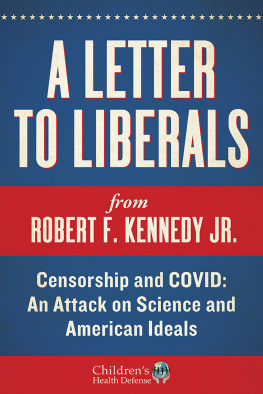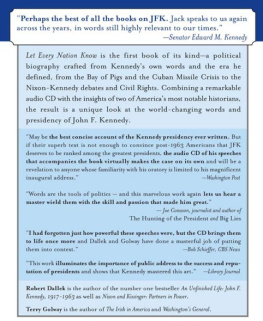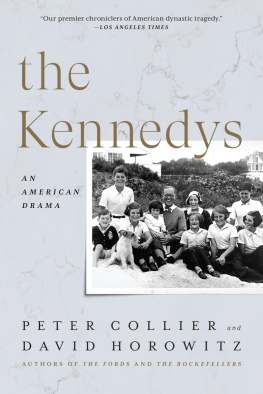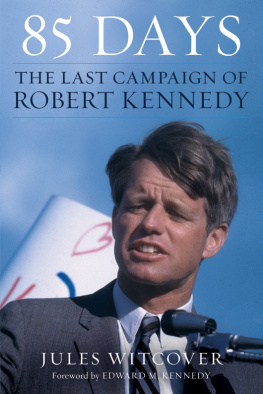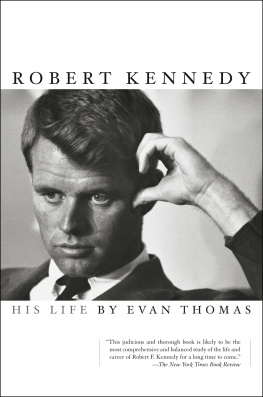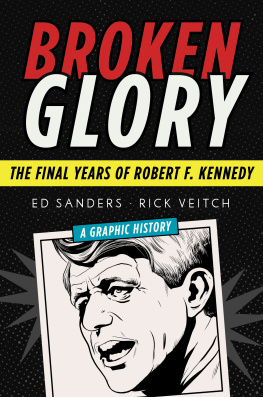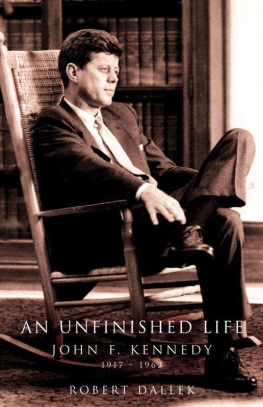THIS BOOK EXISTS because of Ed Guthman. He was my hero, mentor, and friend. One night in 1992 at his house in Pacific Palisades, California, he listened to my idea that there needed to be a published collection of Robert Kennedys speeches, so that younger generations could understand him unmediated by biographers lenses, and that the then-upcoming twenty-fifth anniversary of RFKs death offered a good chance to attract popular attention. Ed nodded and agreed, and I headed home. Barely a week later he called and asked me to come by his house on my way home from work, where he casually said, Ive called Ethel. We have her support. I talked to my agent. He needs a book proposal from us so he can start talking to publishers, and he says the time is short, so hed like it by early next week.
More terrified than excited, in a rush I reminded Ed that I had never written a book, could not possibly pull this off while holding a full-time job, and anyway, had no idea what a book proposal was. Eda decorated army veteran of the Italian campaign in World War II, a Pulitzer Prize winner at age thirty, a newspaper editor beloved by a generation of journalists, #3 on Nixons enemies list, and a key RFK aide, whose friendship spanned the senators life and continued on with his widow and childrenjust stared at me through his black-rimmed Mad Menera glasses without blinking.
Well, he said slowly, you know what you want the book to do, dont you? You said youve been thinking about it for twenty-four years. What are you waiting for? Besides, Ill split it with you.
Thus began a crazy sprint I ran largely between 8 P.M. and 2 A.M. each night. Agent Ron Goldfarb, himself a veteran of RFKs Department of Justice, orchestrated a bidding process ultimately won by Viking Press at Penguin. Ed wrote the first two sections of the book because, as he noted, he had been there; I got to write the last two, covering Kennedys Senate years and his presidential race, a four-year period of my adolescence that had made RFK a lifelong guiding influence. RFK: Collected Speeches came out in 1993, accompanied by an audio version with the brilliant actor and activist Martin Sheen narrating, and featuring the actual speech tapes for many of the selections in the book.
Ed continued (during what were theoretically his retirement years) to teach journalism at the University of Southern Californias Annenberg School for Communication for a total of two decades; was the first chair of the first Los Angeles City Ethics Commission; was one of three members of the special investigations board for Attorney General Reno examining the Branch Davidian confrontation with federal marshals in 1993; served as chairman of the RFK Foundation; and was the hub of a large extended family and immense cadre of friends. He was the most un-self-consciously moral man Ive ever known; everyone has his or her personal North Star, and for me it was always easy: What Would Ed Do?
Ed seemed immortal; for his eightieth birthday, he asked his family to accompany him on a bicycle trip in Ireland. It took a rare and virulent disease to bring him down, and through it, I never heard him complain or seek pity. He remained tough as hell, generous beyond measure, and a patriot in the classic sense. Ed was profiled in Tom Brokaws The Greatest Generation, and with his passing in 2009, we lost a true giant. History books in the end remember only a few of the real heroes of any age. In war and peace, across nearly eighty-nine years, Ed Guthman was his own unique rendition of an American hero.
Before he died, I promised Ed that I would get this book back into publication, and so this edition is entirely in his honor.
The two of us came to this project with differing perspectives, separated by thirty-six years in age and all that gap implies in experiences. Robert Kennedy had a profound influence on both of us, but from vastly disparate ranges: Ed knew him as a friend through the last two decades of Kennedys life and served as his press secretary from 1961 to 1965, while I feel that my aspirations for America and our roles as citizens have been shaped largely by someone I never had the chance to meet.
There was no difference, however, in our aims for this volume or in the criteria we used in selecting a manageable number of Kennedys speeches from the multitude (more than three hundred) that he delivered. We looked for historical interest, character revelation, substantive relevance, enduring theme, and pure beauty of language. We tried to ensure that we included those speeches that were considered major addresses at the time, as well as those so anointed by biographers and historians since thenbut we could not incorporate all of those that we esteemed, and we are certain to have excluded a number prized by others.
For the texts of most of our selections, we are indebted to the John F. Kennedy Presidential Library and Museum, the repository of Robert Kennedys papers. Generally, we used the press release version as the closest to that actually delivered. Where we had audiotape on a given speech, we amended the text to reflect any changes the tape indicated. Throughout, we have used ellipses to show where we have omitted text.
Many people have been invaluable to us in this project. It would have been impossible without the strong support of the Kennedy family. When asked to name his most important accomplishment, Robert Kennedy said, Marrying Ethel. She was her husbands most vital supporter and frequent adviser; this volume benefits from her generous enthusiasm for our project over twenty-five years. She is the godmother of this book and so many other initiatives.
Robert and Ethel Kennedy had eleven children. In diverse ways, they each have gone into the family business, offering leadership in public and private sectors. They have made my life more interesting and considerably more fun, but more important, they have made this world a fairer, more caring, and more hopeful place. I could not have pulled off either edition of this book without Kerry, Joe (and Beth), and Chris opening doors for me and urging me on. I learned constantly from them, as well as from Kathleen, Bobby, Max, Rory, Courtney, and Dougabout their dad, about being an activist, about ceaseless competition and endless generosity, and about what grace under pressure looks like across a lifetime. And Michael, we so miss you.
Kennedys words are the core of this book, but the brief opening essays reflecting on his legacy by notable leaders from around the world are beautiful, highly personal assertions of Kennedys centrality to their lives and ours. I am so grateful to each of these contributors for lending their time and insights to this project, often on very tight deadlines.
The Kennedy library in Boston is part of the National Archives, a governmental agency staffed with expert and gracious men and women. In 1992, Will Johnson, Susan DEntremont, Maura Porter, June Payne, Alan Goodrich, and Jim Cedrone provided hours of assistance. For this edition, the key figure was Laurie Austin of the audiovisual archives, whose knowledge of the RFK photograph collection is as vast as her patience. The National Archives in Maryland is the principal repository of Americas history; there Matthew Heichelbech was vital in helping me find photographic treasures from their vaults. We taxpayers fund our National Archives, and our elected representatives have consistently cut support since the 1990s. It is a foolish savings; these are brilliant, devoted, and hard-working public servants, the keepers of a key part of our collective history and memory. The archives need and deserve far more resources.

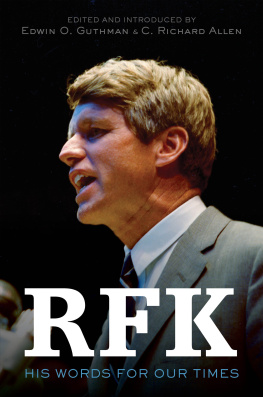
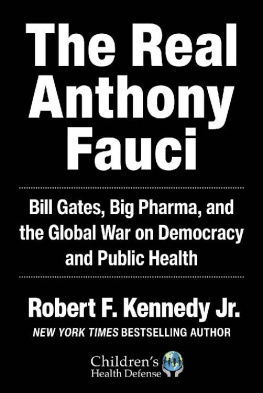
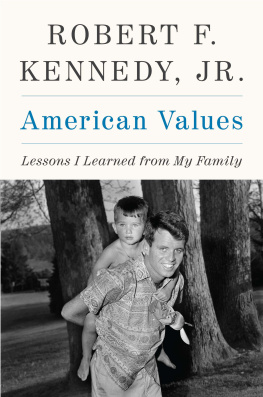
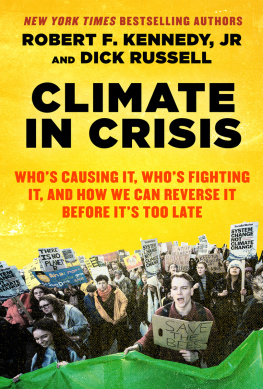
![Robert F. Kennedy - Thimerosal; Let the Science Speak [vaccine]](/uploads/posts/book/264361/thumbs/robert-f-kennedy-thimerosal-let-the-science.jpg)
